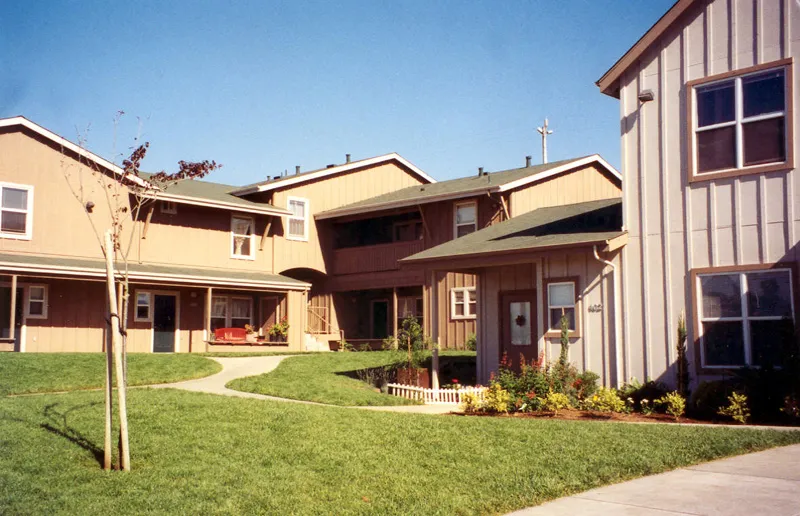California Investments Save More Than 700 Affordable Homes from Losing Affordability Restrictions
Governor Gavin Newsom’s Portfolio Reinvestment Program Launched in 2022 to Continue Preserving Affordable Homes Statewide
April 6, 2023

Photo courtesy of MidPen Housing
Sacramento, CA
To ensure availability of affordable housing for lower-income Californians priced out of the rental market, the Department of Housing and Community Development (HCD) today announced the first of several awards from the new Portfolio Reinvestment Program. This strategic investment of nearly $155.3 million means 726 affordable homes will remain affordable for at least 55 more years, providing housing to more than 14,000 people over the life of the affordability covenants.
The total of affordable homes being preserved under Portfolio Reinvestment Program includes 201 units in the City of Los Angeles, 140 units in San Francisco, 124 homes in Tulare County, 76 units in Butte County, 71 homes in Santa Cruz County, 36 units in Merced County, 40 homes in Monterey County, 21 units in Glenn County, 12 units in Los Angeles County, and five units in Sonoma County.
Preserving existing affordable housing, including ensuring they meet high quality and safety standards as they age, is part of the multi-pronged strategy laid out in California’s Statewide Housing Plan, which calls for building at least 2.5 million new homes by 2030, with a million affordable units. The conversion of affordable to market rate housing is a critical statewide problem—and the Portfolio Reinvestment Program (PRP) is one solution that will ensure housing stability for low- and very-low income households.
“While California continues to devote unprecedented resources to building new affordable housing, it is critically important to preserve the affordable housing we already have,” said Business, Consumer Services and Housing Agency Secretary Lourdes Castro Ramírez. “These dollars will help avoid displacing individuals and families who might otherwise have few, if any, options for remaining safely and stably housed.”
The PRP preserves existing affordable housing projects funded by HCD by extending and restructuring affordability agreements; extending loan maturity dates; providing new low-interest, long-term loans for rehabilitation; and providing forgivable loans to capitalize short-term operating subsidies.
HCD released a $332.5 million Notice of Funding Availability on an over-the-counter basis to affordable housing owners in 2022. HCD will continue to review and award eligible applications until all funds are exhausted.
“Extending the affordable lifetime of each of these homes by more than half a century means they will provide safe, stable housing to many thousands of Californians over the life of their affordability covenant with HCD,” said HCD Director Gustavo Velasquez. “Creating stability at home leads to stability at work and at school, laying a foundation for success that will then allow a new family to move in and experience the same opportunity.”
The awards announced today include the following:
- In the City of Los Angeles, Single Room Occupancy Housing Corporation -- commonly known as SRO Housing -- received $15,276,799 to preserve 70 homes at the historic Regal Hotel, $13,263,748 to preserve 59 homes at Golden West Hotel, and $15,995,263 to preserve 72 homes at Ward Hotel. SRO Housing is a pioneer sponsor of affordable housing in the Skid Row area, with 37 years of experience acquiring, rehabilitating, and preserving single-room occupancy hotels in the neighborhood. Each building awarded is more than 100 years old and houses extremely low-income residents. PRP funds will support much-needed rehabilitation work to improve living conditions for tenants, including replacing outdated plumbing systems, repairing structural and framing systems, and replacing each building’s electrical system. Additionally, Golden West will upgrade from a lift to an elevator to increase accessibility for residents. These upgrades will extend the life of each building so they may continue to provide affordable housing in an area of critical need.
- Tenants and Owners Development Corporation received $15,537,588 to preserve 140 units at Knox SRO within the South of Market neighborhood in the City and County of San Francisco. Within this development, there are 30 units that specifically assist people experiencing chronic homelessness. PRP funding will provide this development with the opportunity to complete critical repairs so it may continue to serve low- and extremely low-income individuals.
- Self-Help Enterprises received $15,160,000 to preserve 60 homes at Villa de Guadalupe and $16,150,000 to preserve 64 homes at Goshen Village, both of which are located in Tulare County. These developments were built in the early 2000s to serve low-income families. The new PRP rehabilitation loan will provide Self-Help Enterprises with the ability to conduct critical repairs to these two projects. Self-Help Enterprises also received $9,508,250 to support rehabilitation of Casitas del Sol, a 36-unit existing affordable housing development in the City of Livingston in Merced County for 50% AMI and below households.
- Mid-Peninsula The Farm, Inc., known as MidPen Housing, received $11,081,875 to preserve 43 affordable homes at San Andreas in the County of Santa Cruz. In 2001, MidPen Housing acquired San Andreas, located in the City of Watsonville, and transformed the project from an uninhabitable farm labor camp into an affordable housing community for farmworker families. There are 42 supportive housing units for agricultural workers within this development.
- Community Housing Improvement Program, Inc., (CHIP) received $5,616,780 for the Shotover Inn Apartments, a 21-home development serving low-income households in unincorporated rural Glenn County. Built in 1930, Shotover Inn Apartments has experienced ongoing wear and tear over the years. The last HCD loan it received was in 1987 for rehabilitation. CHIP also received $19,264,519 for rehabilitation of East of Eaton, a 76-unit development in Butte County that was built in 1992. The new PRP rehab loan will provide Shotover Inn Apartments and East of Eaton an opportunity to update and improve the conditions of properties by extending the remaining life of the property and affordability term to serve households working in a community where a majority of jobs are in agricultural and manufacturing industries.
- The Homes for Life Foundation received $1,534,838 to rehabilitate Wilson House, a six-unit affordable group home in the City of Pasadena built in 1905. Homes for Life Foundation also received $1,639,719 to rehabilitate Buchanan House, a six-unit affordable group home in the City of Highland Park built in 1907. Both projects are located in Los Angeles County and have been operating as group homes since 1989, serving extremely low-income mentally disabled populations. Both projects are over 100 years old and require major rehab for continued longevity. A wheelchair lift will be added at each property to enhance accessibility for tenants with mobility impairments.
- Community Support Network received $394,572 to support the rehabilitation of Grand Avenue, a five-unit affordable Group Home for extremely low-income adults with behavioral health disabilities in the City of Santa Rosa in Sonoma County. These PRP funds will be used to replace the water heaters, windows, and appliances, as well as replace and repair the water drainage system and damaged asphalt surrounding the property.
- Community Housing Improvement Systems and Planning Association, Inc., received $7,590,483 to rehabilitate Vista de la Terraza, a 40-unit affordable housing development for 60% AMI households and below in the City of Salinas in Monterey County. The much-needed rehabilitation will address safety hazards by fixing the upper-level walkways and removing and replacing balconies. This rehab will also include ADA-compliant updates to the exterior stairs.
- Eden Housing, Inc., received $7,278,640 to rehabilitate Pacific Terrace Apartments, a 28-unit affordable housing development for 60% AMI households and below in the City of Freedom in Santa Cruz County. Pacific Terrace Apartments was built in 1996, and rehabilitation is focused on ensuring ADA standards are met. This includes repairs to sidewalks and asphalt and ADA compliance within unit interiors such as showers, bathtubs, toilets, and vanities. The rehabilitation will also include structural upgrades, new water heaters, energy-efficient appliances, and renovating the community room and laundry room.
Learn more about the Portfolio Reinvestment Program.

